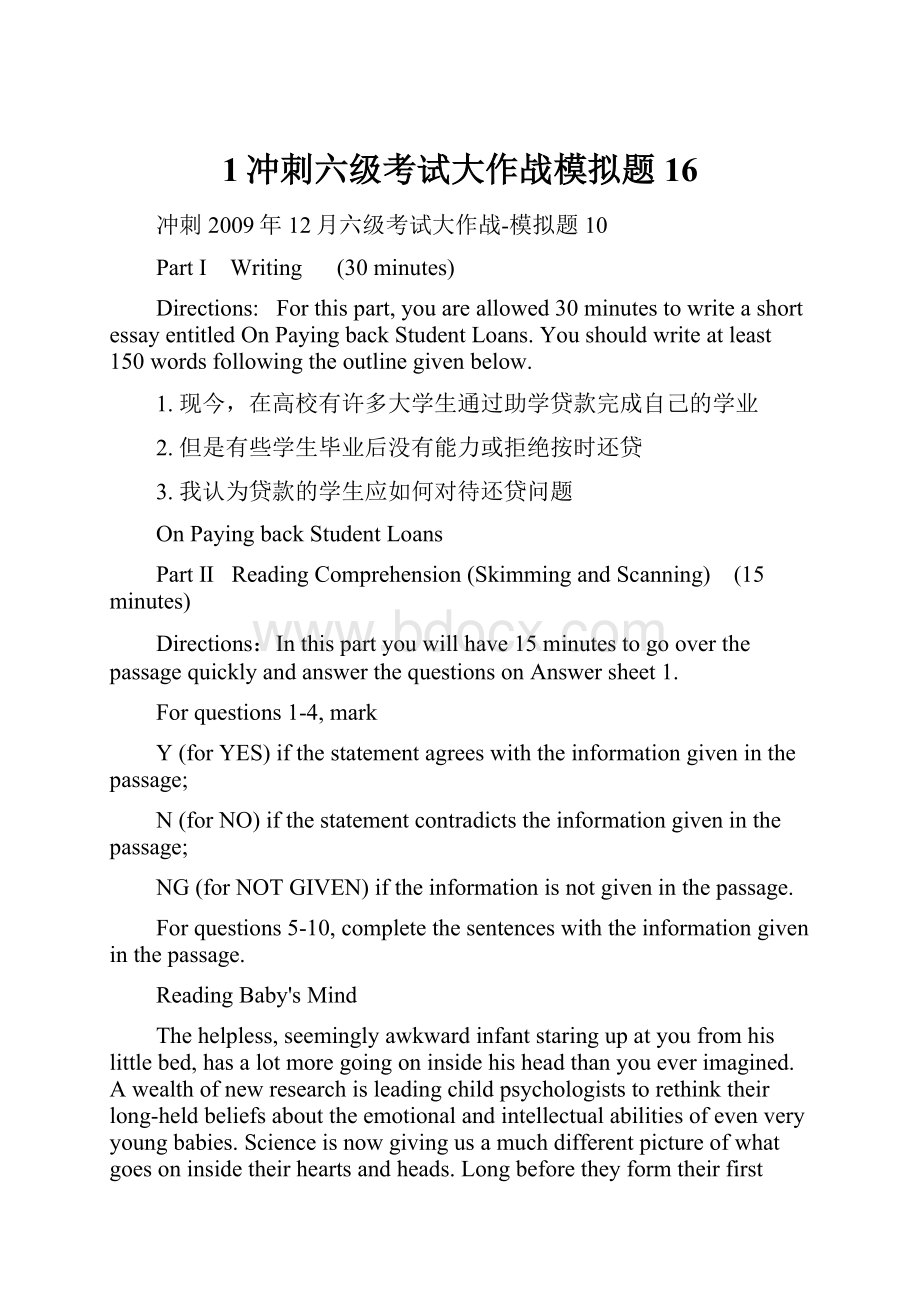1冲刺六级考试大作战模拟题16.docx
《1冲刺六级考试大作战模拟题16.docx》由会员分享,可在线阅读,更多相关《1冲刺六级考试大作战模拟题16.docx(32页珍藏版)》请在冰豆网上搜索。

1冲刺六级考试大作战模拟题16
冲刺2009年12月六级考试大作战-模拟题10
PartⅠ Writing (30minutes)
Directions:
Forthispart,youareallowed30minutestowriteashortessayentitledOnPayingbackStudentLoans.Youshouldwriteatleast150wordsfollowingtheoutlinegivenbelow.
1.现今,在高校有许多大学生通过助学贷款完成自己的学业
2.但是有些学生毕业后没有能力或拒绝按时还贷
3.我认为贷款的学生应如何对待还贷问题
OnPayingbackStudentLoans
PartⅡ ReadingComprehension(SkimmingandScanning) (15minutes)
Directions:
Inthispartyouwillhave15minutestogooverthepassagequicklyandanswerthequestionsonAnswersheet1.
Forquestions1-4,mark
Y(forYES)ifthestatementagreeswiththeinformationgiveninthepassage;
N(forNO)ifthestatementcontradictstheinformationgiveninthepassage;
NG(forNOTGIVEN)iftheinformationisnotgiveninthepassage.
Forquestions5-10,completethesentenceswiththeinformationgiveninthepassage.
ReadingBaby'sMind
Thehelpless,seeminglyawkwardinfantstaringupatyoufromhislittlebed,hasalotmoregoingoninsidehisheadthanyoueverimagined.Awealthofnewresearchisleadingchildpsychologiststorethinktheirlong-heldbeliefsabouttheemotionalandintellectualabilitiesofevenveryyoungbabies.Scienceisnowgivingusamuchdifferentpictureofwhatgoesoninsidetheirheartsandheads.Longbeforetheyformtheirfirstwordsorattemptthefeatofsittingup,theyarealreadymasteringcomplexemotions-jealousy,empathy(移情),frustration-thatwereoncethoughttobelearnedmuchlater.
ANewBabyResearch
LittleVictoriaBatemanisblue-eyedandascuteababyasthereeverwas.At6months,sheisalsotrustingandunsuspecting,whichisagoodthing,becauseotherwiseshe'dnevergoalongwithwhat'sabouttohappen.It'sasunnyJuneafternooninLubbock,Texas,andinsidetheHumanScienceslabatTexasTechUniversity,Victoria'smotherissettlingherdaughterintoahighchair,wheresheisthelatestsubjectinanongoingexperimentaimedatunderstandingthewaybabiesthink.SybilHart,anassociateprofessorofhumandevelopmentandleaderofthestudy,trainsvideocamerasonmotheranddaughter.Everythingisset.Harthandsthemother,CherylBateman,achildren'sbook, ElmoPopsIn, andinstructshertoengrossherselfinitspages."Justhaveaconversationwithmeaboutthebook,"Harttellsher."Themostimportantthingis,donotlookatVictoria."Asthetwowomenchat,Victorialooksaroundtheroom,feelingalittlebored.
Afterafewminutes,Hartleavestheroomandreturnscradlingalifelikebabydoll.Dramatically,HartplacesitinCherylBateman'sarms,andtellshertoembracethedollwhilecontinuingtoignoreVictoria."That'sOK,littlebaby," Batemancoos,huggingandrockingthedoll.Victoriaisnotboredanymore.Atfirst,shecracksherbestsmile.Whenthatdoesn'twork,shebeginskicking.Buthermompayshernomind.That'swhenVictorialosesit.Soonshe'scryingsoharditlookslikeshemightspitup.Hartrushesin."OK,we'redone,"shesays,andtakesbackthedoll.CherylBatemangoestocomfortherdaughter."I'veneverseenherreactlikethattoanything,"shesays.Overthelast10months,Harthasrepeatedthescenehundredsoftimes.It'sthesameinnearlyeverycase:
tinybabies,overwhelmedwithjealousy.EvenHartwasstunnedtofindthatinfantscouldexperienceanemotion,which,untilrecently,wasthoughttobewaybeyondtheirgrasp.
FindingsofBabyResearch
Thenewresearchissuretoconfusenewparents-see,Juniorisagenius-butit'smorethanjustanacademicexercise.Armedwiththenewinformation,pediatricians(儿科医生)arestartingtochangethewaytheyevaluatetheiryoungestpatients.Inadditiontotrackingphysicaldevelopment,theyarenowfocusingmuchmoredeeplyonemotionaladvancement.Theresearchshowshowpowerfulemotionalwell-beingistoachild'sfuturehealth.Ababywhofailstomeetcertainkey"emotionalmilestones" mayhavetroublelearningtospeak,readand,later,dowellinschool.Byreadingemotionalresponses,doctorshavebeguntodiscoverwaystotellifababyasyoungas3monthsisshowingearlysignsofpossiblepsychologicaldisorders,includingdepression,anxiety,learningdisabilitiesandperhapsautism.
Oneoftheearliestemotionsthateventinybabiesdisplayis,admirablyenough,empathy.Infact,concernforothersmaybehard-wiredintobabies'brains.Placeanewborndownnexttoanothercryinginfant,andchancesare,bothbabieswillsoonbewailing(悲叹)away."Peoplehavealwaysknownthatbabiescrywhentheyhearotherbabiescry,"saysMartinHoffman,apsychologyprofessoratNewYorkUniversitywhodidthefirststudiesoninfantempathyinthe1970s."Thequestionwas,whyaretheycrying?
" Doesitmeanthatthebabyistrulyconcernedforhisfellowhuman,orjustannoyedbytheracket?
ArecentstudyconductedinItaly,whichbuiltonHoffman'sownwork,haslargelysettledthequestion.Researchersplayedforinfantstapesofotherbabies'crying.Aspredicted,thatwasenoughtostartthetearsflowing.Butwhenresearchersplayedbabies, recordingsoftheirowncries,theyrarelybegancryingthemselves.Theverdict:
"thereissomeempathyinplace,rightfrombirth,"Hoffmansays.Theintensityoftheemotiontendstofadeovertime.Babiesolderthan6monthsnolongercrybutgrimace(作苦相)atthediscomfortofothers.By13to15months,babiestendtotakemattersintotheirownhands.They'lltrytocomfortacryingplaymate."WhatIfindmostcharmingiswhen,evenifthetwomothersarepresent,they'llbringtheirownmotherovertohelp," Hoffmansays.
Partofthatempathymaycomefromanotherearly-babyskill,theabilitytodiscernemotionsfromthefacialexpressionsofthepeoplearoundthem."Mosttextbooksstillsaythatbabiesyoungerthan6monthsdon'trecognizeemotions,"saysDianeMontague,assistantprofessorofpsychologyatLaSalleUniversityinPhiladelphia.Toputthatbelieftothetest,Montaguecameupwithatwistoneveryinfant'sfavoritegame,andrecruiteddozensof4-month-oldstoplayalong.Shebeganbypeekingaroundaclothwithabigsmileonherface.Predictably,thebabiesweredelighted,andstaredatherintently-thetime-testedwaytotellifababyisinterested.Onthefourthpeek,though,Montagueemergedwithasadlookonherface.Thistime,theresponsewasmuchdifferent."Theynotonlylookedaway,"shesays,butwouldn'tlookbackevenwhenshebegansmilingagain.Refusingtomakeeyecontactisaclassicbabysignofdistress.Anangryfacegottheirattentiononceagain,buttheirfacesshowednopleasure."Theyseemedprimedtobealert,evenvigilant,"Montaguesays."Irealizethat'sspeculativeinregardtoinfants...Ithinkitshowsthatbabiesyoungerthan6monthsfindmeaninginexpressions."
Theyarealsofarmoresophisticatedintellectuallythanweoncebelieved.Babies,asyoungas4months,haveadvancedpowersofdeductionandanabilitytounderstandtheintricatepatterns.Theyhaveasurprisinglyvisualpalette(燃料,调色板),whichenablesthemtonoticesmalldifferences,especiallyinfaces,thatadultsandolderchildrenlosetheabilitytosee.Untilababyis3monthsold,hecanrecognizeaphotographofhismotherjustasquicklyasaphotoinwhicheverythingisintherightplace.
ChallengesandDangersofBabyResearch
Thismightbeagoodplacetopauseforawordaboutthechallengesanddangersofbabyresearch.Sincethesubjectscan'tspeakforthemselves,figuringoutwhat'sgoingoninsidetheirheadsisoftenamatterofreadingtheirfacesandbodylanguage.Ifthisseemsspeculative,it'snot.Overdecadesoftrialanderror,researchershavefine-tunedtheirobservationskillsandzeroedinonnumerousconsistentbabyresponsestovariousstimuli:
howlongtheystareatanobject,whattheyreachoutforandwhatmakesthemrecoilinfearordisgustcanoftentellexperiencedresearcherseverythingtheyneedtoknow.Morerecently,scientistshaveaddedEEGsandlasereyetracking,whichallowmoreprecisereadings.
1. Thepassageismainlyaboutthoseresearchesthatfocusontheemotionalandintellectualabilitiesofthoseveryyoungbabies.
2. ThepurposeoftheexperimentonVictoriaBatemanistofindouthowimportantthemother'sloveistoherbaby.
3. Intheexperiment,VictoriaBatemancriedbecauseshethoughtthathermotherdidn'tloveheranymore.
4. Onlythroughreadingemotionalresponsescandoctorstellwhethera3-monthbabywillgetpossiblepsychologicaldisorders.
5. Pediatriciansarenowpayinglessattentiontophysicaldevelopmentoftheirbabypatientsbutmoreto_________________.
6. Hoffman'sstudyrevealedthatbabiesareborntoshowothercryingbabies_________________.
7. ThefindingsofDiane'stestdemonstratedthebaby'sabilitytorecognize_________________.
8. Itisamazingtofindthatthevisualpaletteofababyhelpshimtonotice_________________.
9. Asforthechallenges,thoseresearchershavetoobtainthosefindingsaboutbabies'mindbyreading_________________.
10. Inordertogainmoreprecisereadings aboutbabies' mind,scientistshaveadoptedtheskillsofEEGsand_________________.
PartⅣReadingComprehension(ReadinginDepth)(25minutes)
SectionA
Directions:
Inthissection,thereisashortpassagewith5questionsorincompletestatements.Readthepassagecarefully.ThenanswerthequestionsorcompletethestatementsinthefewestpossiblewordsonAnswerSheet2.
Questions47to51arebasedonthefollowingpassage.
Theyarepeoplewhostruggletomaketheirvoiceheard,buttheworldislikelytohearmoreandmoreaboutthem.Iftheyallbelongedtoonenation,itwouldbeafairsize,